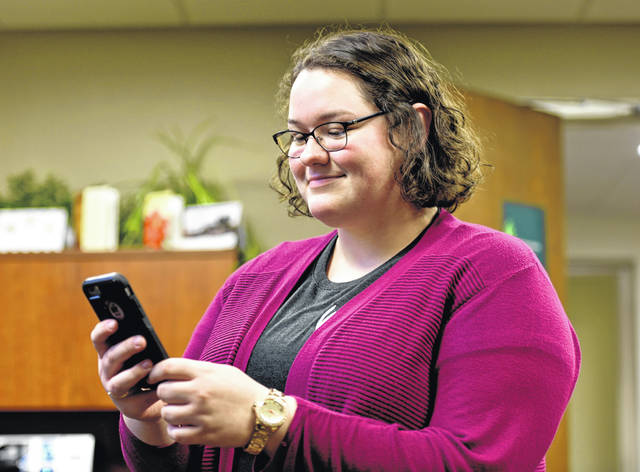
WILMMINGTON — A class of Wilmington College students learned how the nation’s obsession with social and other digital media is, in some measure, preventing them from living their lives both in person and in the present.
A culminating project in Dr. Audrey Wagstaff’s Media for Social Change course involved a 24-hour media exclusion project in which her students refrained from media use for a full day: that’s television, radio, computers, music players, tablets and, yes, even their Galaxy and iPhones.
Students emerged from that experience with a more realistic view of how media use can consume time, distract them from in-person interaction and alter their sense of reality.
“Many self-reported having a great deal of anxiety about being separated from their devices, while simultaneously acknowledging that their devices separate them from themselves and from others,” said Wagstaff, associate professor of social science.
She said that many students “carefully and deliberately” planned their exclusion period, alerting parents and friends they would be electronically incommunicado, and eliminating temptations by allowing batteries to die, carrying noise-canceling headphones and even forking over their devices to others.
Several students recognized they habitually use their smart phones as defensive mechanisms.
“The most difficult part was breaking routine,” noted one student when the class discussed the experiment. “I’ve used media to protect myself.”
Another commented, “We often times think of what we could do to avoid self-reflection and we deliberately go on our phones to avoid interacting with people in person.”
Wagstaff said that, in responding to anything we see as “uncomfortable,” we often use our phone to “fix” it.
“As a society, we think we are advancing and improving ourselves, but we are actually only hurting ourselves and our social skills,” she added,
One student realized, “I anticipated a few instances of boredom, but never the negativity I went through. I decided to go back and see if I could determine why I experienced what I did, and the answer was distractions. Normally, I subconsciously use media when I begin to experience negative emotion, in order to distract myself. Without a distraction, I was left to contemplate unpleasant memories, as there was nothing preventing my brain from doing so.”
Others questioned the connective power of media, acknowledging that their devices had become a barrier to not only connectivity, but to productivity.
“It is true that media connect us, but are media bringing us too close to the point that they take away from the quality of a face-to-face conversation?” Wagstaff posed.
“The day in which I didn’t have any media was probably the day I have done the most since being at Wilmington College,” a student said.
Another engaged in an especially positive experience in which the student used his time wiociety, we think we are advancing and improving ourselves, but we are actually only hurting ourselves and our social skills,” she added,
One student realized, “I anticipated a few instances of boredom, but never the negativity I went through. I decided to go back and see if I could determine why I experienced what I did, and the answer was distractions. Normally, I subconsciously use media when I begin to experience negative emotion, in order to distract myself. Without a distraction, I was left to contemplate unpleasant memories, as there was nothing preventing my brain from doing so.”
Others questioned the connective power of media, acknowledging that their devices had become a barrier to not only connectivity, but to productivity.
“It is true that media connect us, but are media bringing us too close to the point that they take away from the quality of a face-to-face conversation?” Wagstaff posed.
“The day in which I didn’t have any media was probably the day I have done the most since being at Wilmington College,” a student said.
Another engaged in an especially positive experience in which the student used his time without media to distribute food and to engage in conversation with those far less fortunate in economically-disadvantaged parts of Columbus.
“This gave me such a sense of fulfillment in my mission for the day,” he said. “These are the type of interactions I was seeking and it made me feel like I had the power to offer change in people’s lives.”
Certainly, his experience of disconnecting from media was not as stressful as he and other students had imagined, Wagstaff noted.
However, while others openly admitted fear for being disconnected, they also began to “cultivate new fears” about losing connections because of their own and others’ dependence on their devices. thout media to distribute food and to engage in conversation with those far less fortunate in economically-disadvantaged parts of Columbus.
“This gave me such a sense of fulfillment in my mission for the day,” he said. “These are the type of interactions I was seeking and it made me feel like I had the power to offer change in people’s lives.”
Certainly, his experience of disconnecting from media was not as stressful as he and other students had imagined, Wagstaff noted.
However, while others openly admitted fear for being disconnected, they also began to “cultivate new fears” about losing connections because of their own and others’ dependence on their devices.


